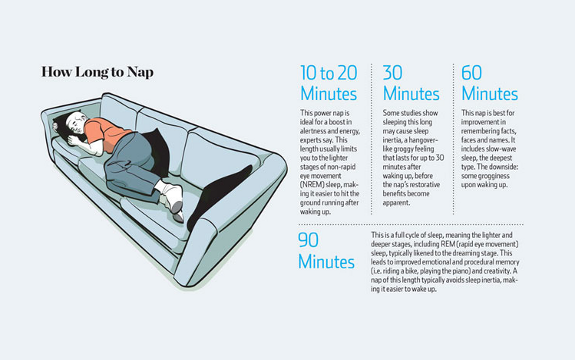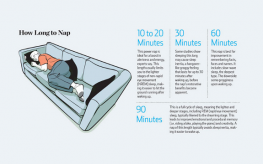Napping can Dramatically Increase Learning, Memory, Awareness, and More

 In some places, towns essentially shut down in the afternoon while everyone goes home for a siesta. Unfortunately, in the U.S.—more bound to our corporate lifestyles than our health—a mid-day nap is seen as a luxury and, in some cases, a sign of pure laziness. But before you feel guilty about that weekend snooze or falling asleep during a movie, rest assured that napping is actually good for you and a completely natural phenomena in the circadian (sleep-wake cycle) rhythm.
In some places, towns essentially shut down in the afternoon while everyone goes home for a siesta. Unfortunately, in the U.S.—more bound to our corporate lifestyles than our health—a mid-day nap is seen as a luxury and, in some cases, a sign of pure laziness. But before you feel guilty about that weekend snooze or falling asleep during a movie, rest assured that napping is actually good for you and a completely natural phenomena in the circadian (sleep-wake cycle) rhythm.
As our day wears on, even when we get enough sleep at night, our focus and alertness degrade. While this can be a minor inconvenience in modern times, it may have meant life or death for our ancestors. Whether you are finishing up a project for work or hunting for your livelihood, a nap can rekindle your alertness and have your neurons back up and firing on high in as little as 15 to 20 minutes.
Big name (and high-dollar) companies recognize this. Google and Apple are just a few that allow employees to have nap time. Studies have affirmed that short naps can improve awareness and productivity. Plus, who wouldn’t love a boss that lets you get a little shut-eye before the afternoon push?
A study from the University of Colorado Boulder found that children who missed their afternoon nap showed less joy and interest, more anxiety, and poorer problem solving skills than other children. The same can be seen in adults that benefit from napping.
Researchers with Berkeley found an hour nap to dramatically increase learning ability and memory. Naps sort of provide a reboot, where the short term memory is cleared out and our brain becomes refreshed with new defragged space.
Read: Sleep Removes Toxic Waste from the Brain
So how long should you nap?

Experts say a 10 to 20 minute “power nap” is best for refreshing your mind and increasing energy and alertness. The sleep isn’t as deep as longer naps, which allows you to get right back at your day upon waking.
A 30 minute nap can lead to 30 minutes of grogginess, as you are often waking just as your body enters the deeper stages of sleep. You’ll experience some of that same fogginess if you sleep for an hour, but 60 minute naps are good for memory boosting.
The longest naps—around 90 minutes—are good for those people who just don’t get enough sleep at night. It’s a complete sleep cycle and can improve emotional memory and creativity.
Naps are good for you—physically and mentally. But don’t sacrifice night time zzz’s for an afternoon snooze; take your nap in addition to a good night’s sleep.

Many of us have no time to nap, and some try it but cannot sleep. For some, I suggest laying down and resting/reclining on a recliner, perhaps play soft music, then doing some stretches after getting up.
This article was based upon studies done in sleep labs and discusses the types of benefits your brain gets after certain increments of sleep. Your comment is about resting when you are tired and has no basis in science or parallel to this article. What quantifiable benefit can be attained by resting the way that you suggest?
chill bro… take a nap
No doubt many of us aren’t allowed a nap, but what you suggest does not have the same positive impact on mental capacity and awareness as actual sleep. The key from this article is knowing the sleep cycles, which is how you can plan out your naps. My suggestion would be not to attempt napping at all if you cannot work around the sleep cycles to your advantage. It is a delicate thing, you nap for too short or too long, then you risk awakening in a deeper sleep state and feeling even more tired.
every time i take a nap sleep inertia hits me like a ton of bricks and last for about a hour afterward so i try to avoid naps unless i have to or i didnt sleep well the night before
I fell asleep trying to read the “FINE PRINT”
What is this? A post for ants?!
you can but it all becomes blurry…. It’s not a Vector image… Im with eat on this one …
Good one.. 😀
Smoke weed it’s gives you better nappy!I